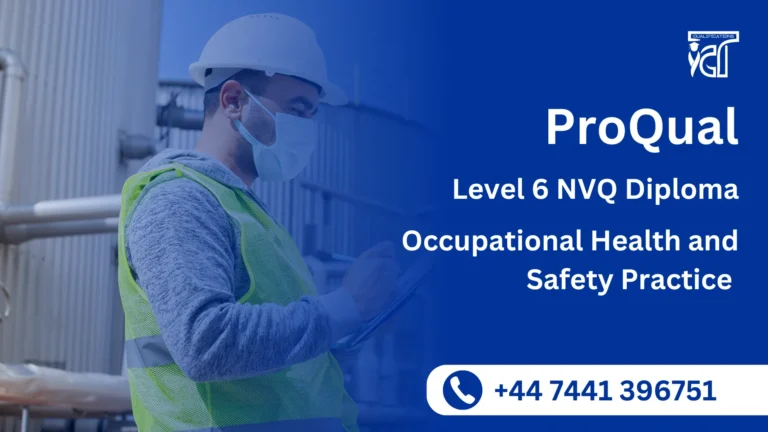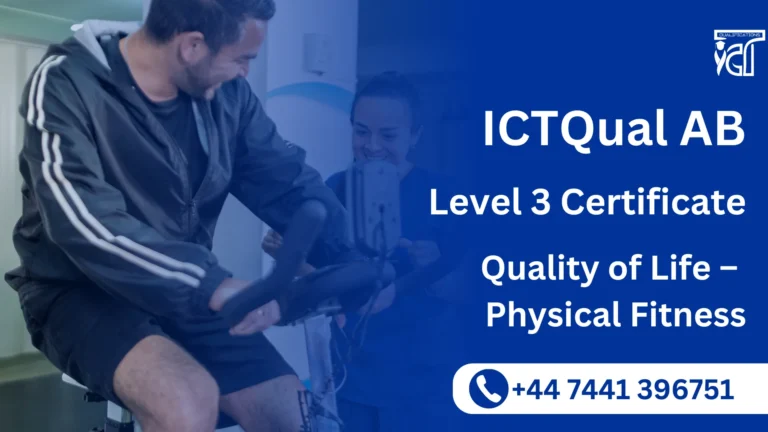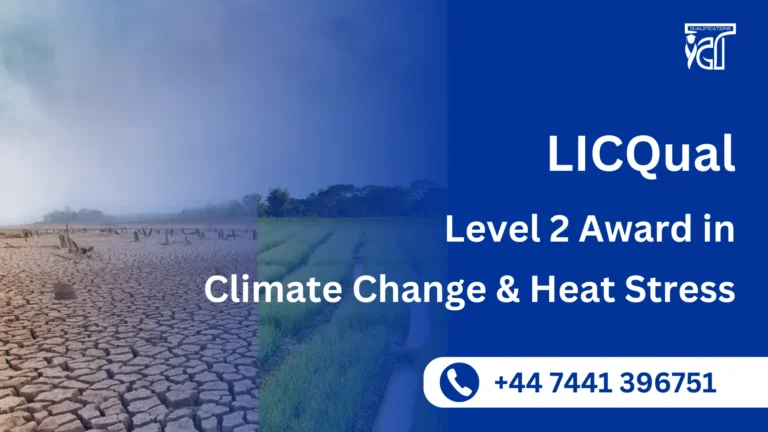In an era where sustainability and environmental consciousness are at the forefront of global discussions, managing waste and its environmental impact has never been more critical. The ProQual Level 3 Award in Energy Management: Waste Management is a comprehensive, Ofqual-regulated qualification designed to provide professionals with the knowledge and skills necessary to manage waste effectively and responsibly in various sectors.
This qualification focuses on energy management within the context of waste management, empowering individuals and organizations to make informed decisions that help reduce waste, increase recycling, and minimize environmental damage. Offered entirely through assignment-based assessments, this course offers a practical, flexible approach to learning.
The ProQual Level 3 Award in Energy Management: Waste Management provides in-depth knowledge of waste management practices, regulations, and sustainability goals. It offers a unique blend of energy management and waste management principles, ensuring that professionals are equipped with the skills needed to reduce energy consumption in waste operations, increase waste efficiency, and meet sustainability targets.
As an Ofqual-regulated qualification, this course adheres to national standards, ensuring that learners receive a recognized and credible qualification. Unlike traditional exam-based learning, the assignment-based format allows students to apply real-world solutions, making it an ideal choice for busy professionals who want to enhance their expertise without the pressure of exams.
The ProQual Level 3 Award in Energy Management: Waste Management is a comprehensive, practical, and Ofqual-regulated qualification designed for professionals aiming to improve sustainability and energy efficiency within waste management systems. Whether you are a waste management professional, energy manager, sustainability consultant, or operations manager, this course provides the knowledge and tools needed to reduce energy consumption, enhance waste management practices, and align with sustainability goals.
With its assignment-based learning, the qualification offers a practical, flexible approach to gaining expertise in the rapidly growing fields of waste and energy management. Investing in this qualification will not only enhance your skills but also contribute to global sustainability efforts by helping organizations optimize their waste management processes and reduce their environmental impact.
ProQual Level 3 Award in Energy Management : Waste Management
ProQual Level 3 Awards in Energy Management consists of 1 mandatory unit having 25 Guided learning hours.
| Sr# | Unit Title | Unit Level | GLH |
|---|---|---|---|
| 1 | Energy Management : Waste Management | 1 | 25 |
GLH (Guided Learning Hours) and TQT (Total Qualification Time) are terms commonly used in vocational qualifications to help define the amount of time a learner is expected to spend on their studies.
1. GLH (Guided Learning Hours)
GLH refers to the number of hours a learner spends being directly taught, supervised, or supported during their course. This includes the time spent in activities such as:
- Classroom instruction
- Practical workshops
- One-on-one tutoring or mentoring sessions
- Online learning sessions with tutor support
In other words, GLH represents the time that learners are actively engaged with their instructors or learning activities.
2. TQT (Total Qualification Time)
TQT represents the total amount of time a learner is expected to invest in completing a qualification, including:
- GLH (Guided Learning Hours): Time spent on direct learning, as explained above.
- Self-Directed Learning: This includes time spent on independent study, research, assignment completion, preparation for exams, and any other work the learner does outside of direct teaching hours.
TQT is a broader measure that includes all the time required to achieve the qualification. It helps learners and employers understand the overall commitment required for the qualification.
Key Differences Between GLH and TQT:
- GLH focuses on direct learning with guidance or supervision.
- TQT includes GLH as well as independent study time and other learning-related activities.
Example:
If a qualification has a TQT of 600 hours and a GLH of 250 hours, it means the learner should spend 250 hours in direct learning (classroom, online, or tutor-led sessions) and 350 hours on independent study or research.
ProQual Level 3 Award in Energy Management : Waste Management
Energy Management : Waste Management
- Understand key challenges in waste streams and the appropriate use of waste
- Understand financial advantages and disadvantages of their organisation’s waste stream
- Understand the use of waste as a renewable resource
- Be able to undertake a basic audit of greenhouse gas emissions in their workplace
Benefits of the ProQual Level 3 Award in Energy Management: Waste Management
The ProQual Level 3 Award in Energy Management: Waste Management offers a range of benefits for professionals looking to enhance their expertise in sustainable waste management practices. This qualification empowers individuals and organizations to optimize waste handling processes while ensuring energy efficiency and regulatory compliance. Below are the key benefits of this course:
1. Practical, Real-World Learning
- The assignment-based structure provides practical, real-world applications of energy management and waste management principles. Learners can directly apply their knowledge in their workplaces, making it highly relevant and beneficial for immediate implementation.
2. Improved Waste Efficiency and Cost Savings
- By learning to optimize waste management practices, participants can significantly reduce waste disposal costs, improve recycling rates, and enhance overall operational efficiency. This leads to long-term financial savings and better resource utilization.
3. Sustainability and Environmental Impact Reduction
- The course teaches sustainable waste management practices that contribute to minimizing environmental impact. Professionals will gain the skills needed to reduce carbon footprints, achieve waste reduction goals, and implement energy recovery systems, aligning with global sustainability targets.
4. Enhanced Regulatory Compliance
- Participants gain a strong understanding of the legal and regulatory frameworks that govern waste management and energy use. This ensures that organizations comply with local, national, and international regulations, avoiding penalties and improving environmental practices.
5. Career Advancement Opportunities
- Completing this qualification boosts your professional profile, opening up new career opportunities in waste management, sustainability, and energy efficiency. The skills acquired will position you for roles with greater responsibility and leadership in the growing fields of energy and environmental management.
6. Increased Professional Credibility
- As an Ofqual-regulated qualification, the ProQual Level 3 Award is widely recognized across the UK and internationally. It adds credibility to your resume and demonstrates your commitment to professional development in the energy management and sustainability sectors.
7. Cost-Effective Energy Management
- Learn how to integrate energy management techniques into waste operations, helping businesses lower their energy consumption. Understanding energy recovery and efficiency methods can lead to significant savings in energy costs, benefiting both the environment and your organization’s bottom line.
8. Comprehensive Knowledge of Waste and Energy Integration
- The course provides in-depth knowledge of both waste and energy management, allowing professionals to create more integrated, efficient systems. This knowledge is invaluable for reducing waste in energy processes, improving overall energy efficiency, and optimizing resource use.
9. Flexibility in Learning
- The assignment-based format offers flexibility, allowing students to learn at their own pace while balancing work and other commitments. This makes it easier for professionals to fit their studies around their careers, enhancing the overall learning experience.
10. Contributing to Global Sustainability Goals
- With waste management and energy efficiency becoming key components of sustainability goals worldwide, this qualification enables professionals to contribute directly to global environmental objectives. This knowledge is critical for organizations striving to meet net-zero emissions and carbon neutrality target.
The ProQual Level 3 Award in Energy Management: Waste Management is designed for professionals across various sectors who want to enhance their knowledge and skills in managing waste and energy efficiently. Below is an overview of the best-fit candidates for this course:
1. Waste Management Professionals
- Individuals already working in waste management roles, such as waste disposal, recycling, and waste collection services, will find this course beneficial. It will help them develop more efficient and sustainable waste management practices, optimize energy usage in waste operations, and meet environmental goals.
2. Energy Managers and Sustainability Officers
- Energy managers and sustainability officers who are responsible for improving energy efficiency and reducing environmental impact within their organizations will gain valuable insights into how waste management can tie into broader energy and sustainability strategies. This course will help them integrate energy recovery practices and optimize waste-to-energy systems.
3. Fleet and Operations Managers in Waste Management
- Fleet and operations managers in waste management facilities or recycling plants will benefit from learning how to reduce energy consumption, enhance operational efficiency, and implement sustainable waste handling techniques, resulting in cost savings and improved performance.
4. Environmental Compliance Officers
- Professionals responsible for ensuring that companies adhere to environmental regulations and standards will find this qualification essential. It provides knowledge of the regulatory landscape for waste management and energy use, helping ensure compliance and avoid penalties.
5. Environmental Consultants and Sustainability Advisors
- Environmental consultants or sustainability advisors who assist businesses in adopting eco-friendly practices will benefit from a deeper understanding of energy-efficient waste management strategies. This knowledge will allow them to offer more comprehensive advice on integrating sustainable waste management solutions.
6. Operations Managers in Manufacturing or Industrial Sectors
- Operations managers in industries with significant waste production, such as manufacturing, construction, or food production, can use this qualification to manage waste more effectively, reduce disposal costs, and implement energy-efficient solutions in waste handling processes.
7. Public Sector Professionals
- Government employees and public sector professionals working in environmental sustainability, waste management, or policy creation will benefit from the course. It provides valuable insights into waste regulations, energy recovery systems, and strategies for reducing environmental impact at the community or organizational level.
8. Business Owners and Managers
- Business owners and managers looking to integrate waste reduction and energy efficiency into their operations will find this course essential. It provides practical knowledge for managing waste effectively, reducing energy costs, and enhancing their company’s sustainability credentials.
9. Students or Career Changers
- Students or individuals transitioning into environmental or energy management careers will find the ProQual Level 3 Award an excellent entry point. It equips them with foundational knowledge in waste management and energy practices, opening doors to opportunities in sustainability-focused industries.
10. Corporate Social Responsibility (CSR) Professionals
- Professionals managing CSR initiatives will find this course beneficial as it provides the tools to implement sustainable waste management systems that align with an organization’s environmental goals and improve its overall sustainability profile.
Entry Requirements
Register Now
Qualification Process
Qualification Process for the ProQual Level 3 Award in Energy Management : Waste Management
- Self-Assessment:
Begin by evaluating your eligibility to ensure you meet the qualification requirements, including work experience, knowledge, and language proficiency. - Registration:
Complete your registration by submitting the required documents, including a scanned copy of a valid ID, and paying the registration fee. - Induction:
An assessor will conduct an induction to confirm your eligibility for the course and explain the evidence requirements. If you do not meet the criteria, your registration will be canceled, and the fee will be refunded. - Assignmnets & Evidence Submission:
Provide all assignmnets and the necessary evidence based on the assessment criteria outlined in the course. If you are unsure of the required evidence, consult with the assessor for guidance on the type and nature of evidence needed. - Feedback and Revision:
The assessor will review your submitted evidence and provide feedback. Evidence that meets the criteria will be marked as “Criteria Met,” while any gaps will be identified. You will be asked to revise and resubmit if needed. - Competence Evidence:
Submit final evidence demonstrating that all learning outcomes have been met. This evidence will be marked as “Criteria Met” by the assessor once it is satisfactory. - Internal Quality Assurance (IQA):
The Internal Quality Assurance Verifier (IQA) will review your evidence to ensure consistency, quality, and compliance with standards. - External Verification:
The IQA will submit your portfolio to ProQual’s External Quality Assurance Verifiers (EQA) for final confirmation. The EQA may contact you directly to verify the authenticity of your evidence. - Certification:
Upon successful completion of all checks, ProQual will issue your official certificate, confirming that you have attained the ProQual Level 3 Award in Energy Management : Waste Management.







